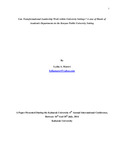Can Transformational Leadership Work within University Settings? A case of Heads of Academic Departments in the Kenyan Public University Setting
Abstract
Transformational visionary and inspirational leadership practices of departmental heads can determine levels of organisational citizenship behavior (OCB) of the academic faculty members in a public university setting. The organisation and management of public university activities depends on active involvement of academic faculty members because they play a vital role in the university’s survival. This implies that university management is incomplete without notable participation of the academic faculty members, whose foundation is laid at the departmental level. Consequently, certain leadership styles have distinct bearing on the levels of obedience, loyalty and participation of employees, which subsequently influence organisational effectiveness. Based on this premise, this paper presents results obtained from a qualitative case study conducted among academic faculty members of one faculty in one of the public universities in Kenya. The purpose of this study was to determine how heads of departments’ visionary and inspirational transformational leadership styles influence the degree of altruism and conscientiousness traits of organisational citizenship behavior (OCB) of the academic faculty members within their departments – and by extension – the effectiveness of the university. The focus is on two traits of transformational leadership, which describe how the degree of vision and inspiration that a leader exhibits can determine how much obedience, loyalty and participation the followers would exhibit even without supervision. Data was obtained through in-depth interviews with the sample heads of departments and academic faculty members. The results obtained add empirical support to the assertions that indicators of organizational effectiveness are associated with employees’ willingness to go above and beyond their job requirements as indicated by the levels of OCB largely influenced by the leadership styles.

